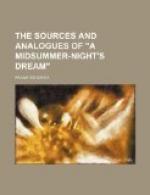As herbs, trees, roots, and plants
In strength and growth are
daily less,
So all things have their wants:
The heavenly signs move and
digress;
And honesty in women’s hearts
Hath not her former being:
Their thoughts are ill, like other parts,
Nought else in them’s
agreeing.
I sooner thought thunder
Had power o’er the laurel
wreath,
Than she, women’s wonder,
Such perjured thoughts should
live to breathe.
They all hyena-like will weep,
When that they would deceive:
Deceit in them doth lurk and sleep,
Which makes me thus to grieve.
Young man’s delight, farewell;
Wine, women, game, pleasure,
adieu:
Content with me shall dwell;
I’ll nothing trust but
what is true.
Though she were false, for her I’ll
pray;
Her falsehood made me blest:
I will renew from this good day
My life by sin opprest.
Moved with this song and other complaints of his, she at last did fancy him, so that the weaver did not like that Robin should be so saucy with his wife, and therefore gave him warning to be gone, for he would keep him no longer. This grieved this loving couple to part one from the other, which made them to make use of the time that they had. The weaver one day coming in, found them a-kissing: at this he said [nothing] but vowed in himself to be revenged of his man that night following. Night being come, the weaver went to Robin’s bed, and took him out of it (as he then thought) and ran apace to the river side to hurl Robin in; but the weaver was deceived, for Robin, instead of himself, had laid in his bed a sack full of yarn: it was that that the weaver carried to drown. The weaver standing by the river side said:—Now will I cool your hot blood, Master Robert, and if you cannot swim the better you shall sink and drown, With that he hurled the sack in, thinking that it had been Robin Good-fellow. Robin, standing behind him, said—
For this your kindness, master, I you
thank:
Go swim yourself; I’ll stay upon
the bank.
With that Robin pushed him in, and went laughing away, ho, ho, hoh!
HOW ROBIN GOOD-FELLOW WENT IN THE SHAPE OF A FIDDLER TO A WEDDING, AND OF THE SPORT THAT HE HAD THERE
On a time there was a great wedding, to which there went many young lusty lads and pretty lasses. Robin Good-fellow longing not to be out of action, shaped himself like unto a fiddler, and with his crowd under his arm went amongst them, and was a very welcome man. There played he whilst they danced, and took as much delight in seeing them, as they did in hearing him. At dinner he was desired to sing a song, which he did to the tune of Watton Town’s End[10].
THE SONG
It was a country lad
That fashions strange would
see,
And he came to a vaulting school,
Where tumblers used to be:
He liked his sport so well,
That from it he’d not
part:
His doxy to him still did cry,
Come, buss thine own sweetheart.




